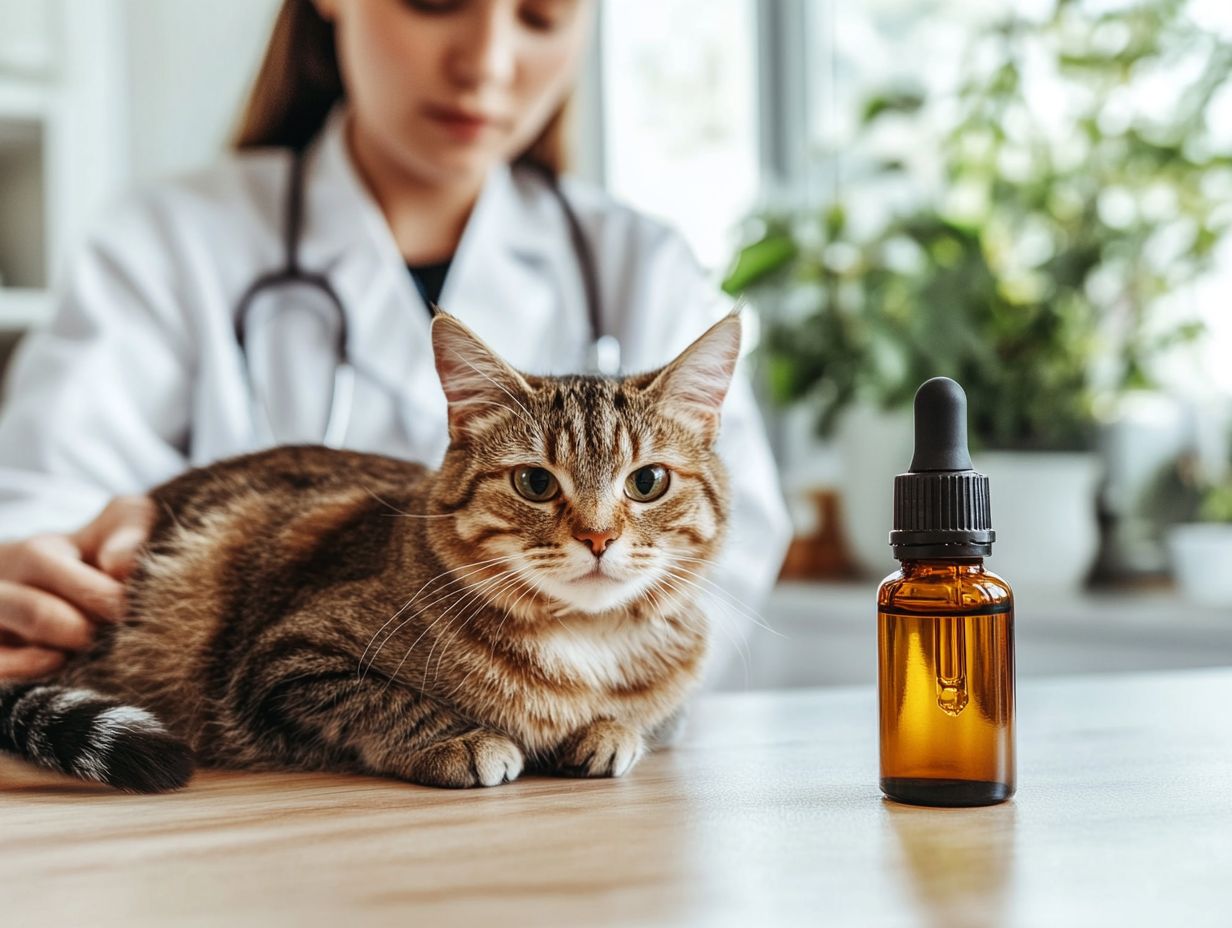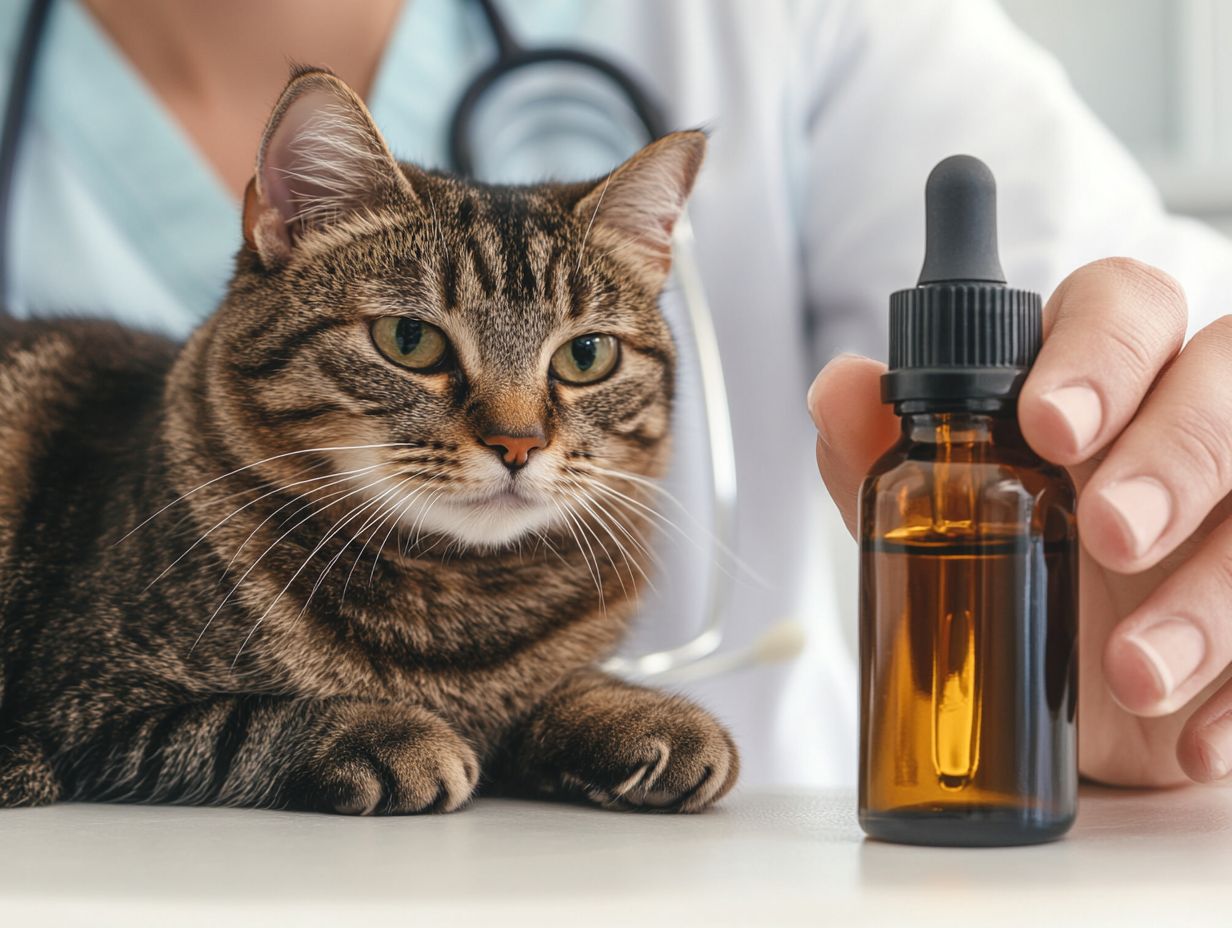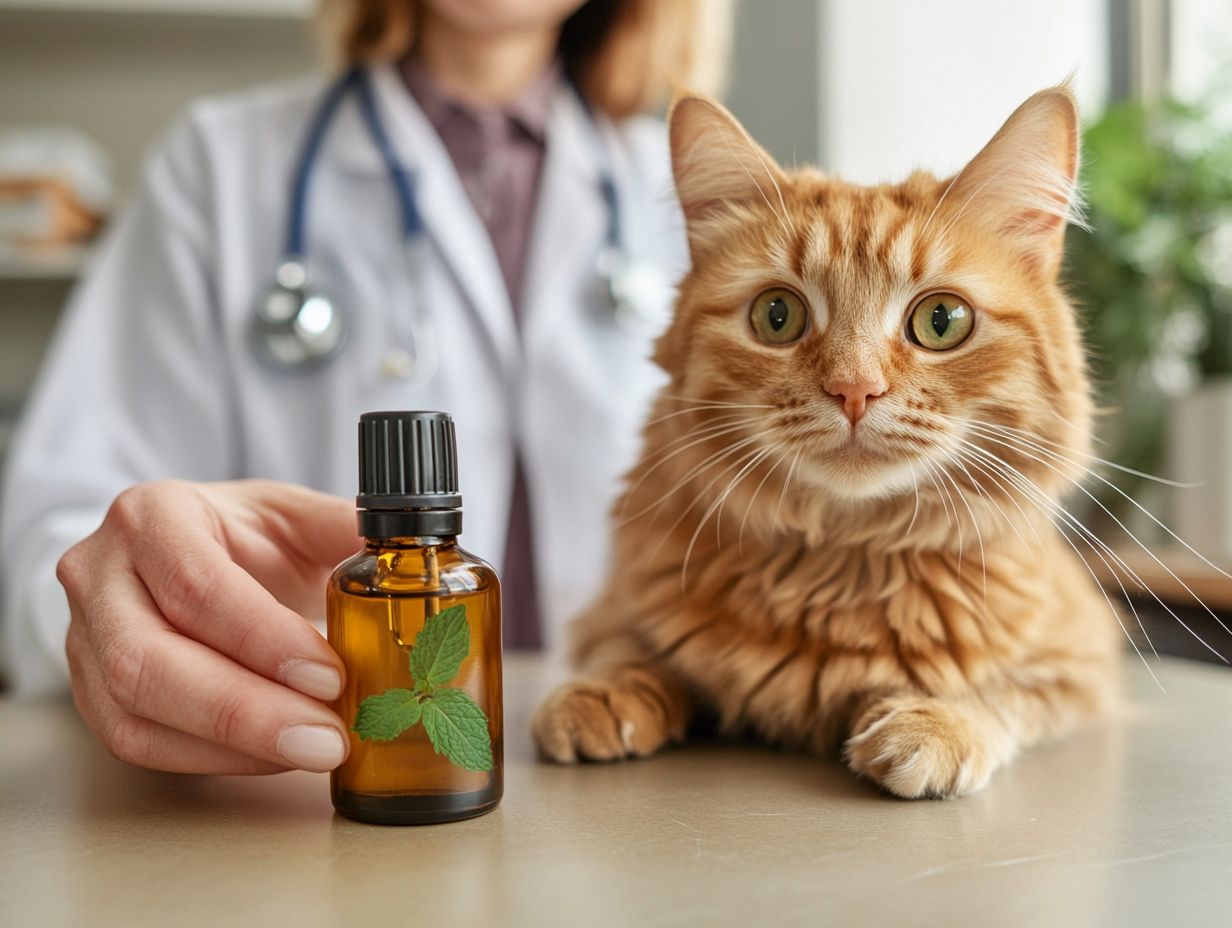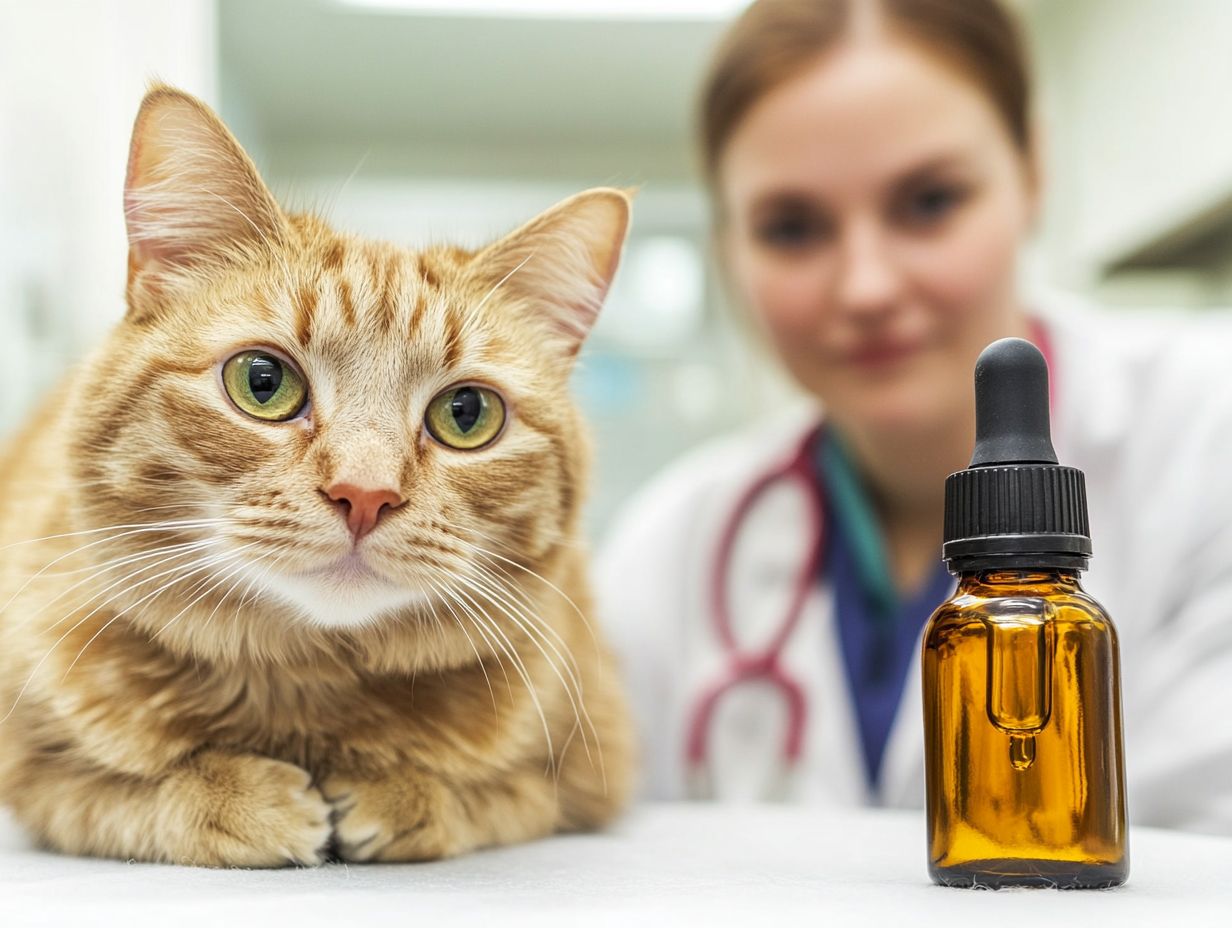Peppermint oil is considered toxic to cats, according to current veterinary consensus. While it offers various health benefits for humans, its concentrated nature poses serious risks to feline health.
Peppermint oil is derived from the leaves of the peppermint plant (Mentha × piperita) and contains toxic compounds, notably menthol and menthone. Exposure to these compounds can lead to essential oil toxicity in cats.
This article explores the potential dangers peppermint oil poses to cats, how they can be exposed, and what symptoms to watch for if exposure occurs.
It provides guidance on treatment options, preventative measures, and safer alternatives, ensuring your furry companion stays healthy and safe.
Key Takeaways:

- Peppermint oil can be dangerous for cats due to its high concentration of naturally occurring chemicals and essential oil compounds.
- Cats can be exposed to peppermint oil through ingestion, inhalation, or topical application.
- Symptoms of peppermint oil poisoning in cats can be categorized into:
- Mild: Vomiting, drooling.
- Moderate: Diarrhea, ataxia.
- Severe: Difficulty breathing, lethargy, respiratory distress. Immediate veterinary care is necessary for treatment.
What is Peppermint Oil?
Peppermint oil (Mentha × piperita) is an essential oil widely used in aromatherapy, personal care products, and cleaning solutions. Its brisk aroma is attributed to several chemical compounds, including menthol and menthone, which contribute to its therapeutic properties, such as mood enhancement and anti-inflammatory effects. It can also act as a natural flea repellent.
While peppermint oil offers various health benefits for humans, cat owners should exercise caution. Using peppermint oil or products containing it around cats poses a risk of essential oil toxicity. For more information, you can read about it in this complete guide on whether peppermint oil is dangerous for cats.
Can Cats Be Exposed to Peppermint Oil?
Cats can be exposed to peppermint oil through direct skin contact, ingestion, or inhalation, all of which can pose significant dangers. Cat owners should be aware that essential oil toxicity presents serious health risks, making it essential to consult with a veterinarian before using peppermint oil in their vicinity.
What Are the Dangers of Peppermint Oil for Cats?
Peppermint oil poses several dangers to cats, including liver damage, breathing problems, and essential oil poisoning. Cats have a unique metabolism that makes them particularly vulnerable to the toxic effects of concentrated oils. Therefore, it is crucial for cat owners to understand the risks associated with peppermint oil before using it in any form.
The potential hazards of using essential oils, such as peppermint, on cats include liver damage, respiratory distress, and other symptoms of essential oil poisoning, which can be fatal if not treated promptly and aggressively. Symptoms may include vomiting, drooling, ataxia, and respiratory distress. Long-term exposure can lead to chronic health issues and diminish a cat’s quality of life.
Cat owners should be aware that even a small amount can lead to toxicity, as cats lack the appropriate enzymes to metabolize oils and other compounds. Informed owners can recognize the early signs of essential oil poisoning and understand the need for veterinary assistance.
How Do Cats Get Exposed to Peppermint Oil?

Cats can be exposed to peppermint oil in several ways: by ingesting it, inhaling it, or coming into contact with surfaces that have been cleaned with products containing the essential oil. Direct skin contact with peppermint oil can also pose significant risks to feline health.
The use of oil diffusers and scented products in the home can inadvertently create environments that expose cats to peppermint oil, raising concerns about their safety and well-being.
What Are the Symptoms of Peppermint Oil Poisoning in Cats?
Symptoms of peppermint oil poisoning in cats can include muscle tremors, gastrointestinal upset, lethargy, and, in severe cases, respiratory distress. Breathing difficulties are a major concern. If these symptoms are caught early, veterinarians can treat the issue before it becomes life-threatening.
First Aid for Suspected Poisoning
If you suspect your cat has been exposed to peppermint oil, follow these steps:
- Immediately remove your cat from the area of exposure.
- If ingestion is suspected, do not induce vomiting unless directed by a veterinarian.
- Contact your veterinarian or an emergency pet poison control hotline, such as ASPCA Animal Poison Control at (888) 426-4435.
- Provide the veterinarian with as much information as possible, including the amount of peppermint oil ingested and your cat’s weight.
Safe Alternatives to Peppermint Oil
For cat owners looking for safer options, consider using cat-safe plants like catnip or valerian. These alternatives provide similar benefits without the risk of toxicity.
It is important to regularly review and update this article as new research emerges about peppermint oil’s effects on cats. This article does not substitute for professional veterinary advice; always consult a veterinarian for specific concerns regarding your pet’s health.
Peppermint oil is toxic to cats due to compounds such as menthol and other constituents of essential oils. It is important for cat owners to be aware of the risks associated with this oil.
Additionally, while the aromatic leaves are often harmless, concentrated forms and essential oils can pose significant health risks.
Symptoms of Peppermint Oil Poisoning
- Mild Symptoms:
- Drooling
- Decreased appetite
- Vomiting
- Moderate Symptoms:
- Difficulty breathing
- Lethargy
- Diarrhea
- Severe Symptoms:
- Seizures
- Muscle tremors
- Coma
Long-term effects may include liver damage and other metabolic disturbances. It is crucial to seek veterinary help if any symptoms are observed.
First Aid for Suspected Exposure
- Contact your veterinarian immediately.
- Remove your cat from the source of exposure.
- If the oil is on the skin, bathe the area with mild soap and water.
- Do not induce vomiting unless instructed by a veterinarian.
What Should You Do If Your Cat is Exposed to Peppermint Oil?
If your cat has been exposed to peppermint oil, the best way to minimize health risks is to contact your veterinarian immediately. They can assess whether it is necessary to manage the essential oil poisoning and advise you on the appropriate next steps.
Depending on the severity of the exposure, your vet may recommend specific treatments or safety precautions.
How is Peppermint Oil Poisoning in Cats Diagnosed?
Diagnosing peppermint oil poisoning in cats involves a veterinarian conducting a thorough examination to assess the cat’s overall health and potentially performing diagnostic tests to evaluate the severity of the essential oil toxicity.
Key components of the diagnosis include the history of exposure and the symptoms observed by the owner. The veterinarian will begin by collecting a detailed medical history, which includes any recent contact with products containing peppermint oil.
The owner’s observations regarding the cat’s condition—such as vomiting, difficulty breathing, and lethargy—are crucial for the veterinarian to assess the severity of the situation and the likelihood of a favorable prognosis. For more information on potential risks, read Is Peppermint Oil Dangerous for Cats? A Vet’s Complete Guide.
In some cases, blood tests may be necessary to evaluate liver function and determine the extent of metabolic distress caused by the toxicity. A urinalysis may also be conducted to detect byproducts of the essential oil in the cat’s urine.
A prompt and accurate diagnosis is essential, as it will guide the course of treatment and available options.
What is the Treatment for Peppermint Oil Poisoning in Cats?

Treatment for peppermint oil poisoning in cats may vary depending on the severity of the symptoms and the overall health of the cat. Typically, it includes supportive care and immediate veterinary attention.
This may involve administering IV fluids, providing medications to alleviate symptoms, and monitoring the cat until it is deemed safe to assume a full recovery is likely. Home remedies should only complement veterinary care and not replace it.
What Are Some Home Remedies for Peppermint Oil Poisoning in Cats?
Home remedies for mild cases of peppermint oil exposure in cats can be beneficial, but they should only be attempted after consulting a veterinarian to ensure their safety and effectiveness.
Some potential home remedies include providing plenty of fresh water and creating a calming environment to facilitate the cat’s recovery. Plus ensuring proper hydration, a serene atmosphere can help the feline feel more at ease during this time.
Using gentle, soothing tones and providing a cozy resting space may reduce anxiety, which is crucial for their overall well-being. Some pet owners have found that a small amount of canned pumpkin can alleviate digestive upset, but this should be discussed with a veterinarian beforehand.
Additionally, home remedy treatments should never replace veterinary care. If symptoms persist or worsen, immediate veterinary attention should be sought, as some reactions may require more specialized treatment to fully protect the cat’s health.
How Can You Prevent Peppermint Oil Poisoning in Cats?
Preventing peppermint oil poisoning in cats involves several key measures, such as:
- Keeping essential oils—including peppermint oil—out of reach.
- Using diluted oils and adhering to safety precautions when utilizing oil diffusers or cleaning products.
- Considering non-toxic alternatives to peppermint oil.
By understanding the risks associated with essential oils, cat owners can take proactive steps to keep their pets safe. Always consult with a veterinarian for the best practices regarding essential oil use.
Common Misconceptions about Essential Oils and Cats
Many believe that essential oils are safe for cats, but this is a myth. Cats metabolize substances differently than humans, making them more sensitive to the compounds in essential oils. Always consult with a veterinarian before using any essential oils around your pets.
Disclaimer: This content is not a substitute for professional veterinary advice. Always consult with a veterinarian regarding your pet’s health and safety.
Last reviewed: [Insert Last Review Date]
Emergency Contact: Save the contact information for ASPCA Animal Poison Control: 1-888-426-4435 for quick assistance in case of poisoning.
Is Peppermint Oil Toxic to Cats?
Peppermint oil is considered mildly toxic to cats, especially if ingested, inhaled, or applied topically in large amounts. The parts of the peppermint plant that pose risks include the essential oil itself, particularly compounds like menthol. It’s essential to consult reputable sources such as the ASPCA’s Animal Poison Control for more information.
What Are Some Safer Alternatives to Peppermint Oil for Cats?
Safer alternatives to peppermint oil for cats include essential oils with lower toxicity, such as lavender, cedarwood, and chamomile, which can have a calming effect. It is essential to consult a veterinarian to ensure that the alternatives you choose are safe for your pet. Essential oil warnings should be considered to maintain cat health and avoid toxic exposure.
Additionally, gentler options like chamomile and frankincense can also be beneficial, as they possess calming properties that help reduce anxiety in cats. Not all essential oils are the same, and each cat may react differently to various substances.
Therefore, before introducing anything new to your pet’s environment, it is crucial to discuss it with a veterinarian who can evaluate your cat’s health history. Another useful option is to use carrier oils, such as coconut or olive oil, to dilute stronger scents.
Symptoms of Peppermint Oil Exposure in Cats
- Mild Symptoms: Mild gastrointestinal upset, drooling.
- Moderate Symptoms: Vomiting, diarrhea, lethargy.
- Severe Symptoms: Breathing difficulties, liver damage.
First Aid for Suspected Peppermint Oil Poisoning
- Contact your veterinarian immediately.
- Do not induce vomiting without professional advice.
- Monitor your cat for any signs of toxicity.
Preventing Cat Exposure to Peppermint Oil
- Store essential oils securely out of reach of pets.
- Use only small amounts and make sure to dilute properly.
- Offer safe alternatives and consult the vet for recommendations.
Common Misconceptions About Peppermint Oil
Many believe that peppermint oil is harmless due to its widespread use in human products. However, cats have a sensitive sense of smell, and even small amounts can lead to health issues.
Balancing the Benefits and Risks of Peppermint Oil
While some essential oils can offer benefits, such as calming properties, they also come with risks. Minor issues like gastrointestinal upset can occur even with non-toxic plants, particularly in sensitive populations like kittens and senior cats.
Visual Aids and Resources
For further information, consider consulting visual aids that identify peppermint oil and related plants, and look for infographics summarizing key safety points.
Expert Insights
Consult with veterinary experts for additional authoritative information on peppermint oil and its effects on cats.
Emergency Contact Information
If you suspect your cat has been poisoned, contact the ASPCA Animal Poison Control Hotline at (888) 426-4435 for immediate assistance.
Regular Updates and Legal Disclaimer
This article will be regularly updated to reflect new research findings. Last review date: October 2023.
This article is not a substitute for professional veterinary advice. Always consult your veterinarian for specific concerns regarding your pet’s health.
Frequently Asked Questions

Is peppermint oil dangerous for cats?
Yes, peppermint oil can be dangerous for cats if ingested, inhaled, or applied topically in large amounts. While small amounts of diluted oils may not cause harm, it is best to avoid using concentrated oils on or around cats due to essential oil toxicity risks.
What are the dangers of peppermint oil for cats?
Peppermint oil contains essential oil compounds like menthol, which can be toxic to cats. Ingestion or direct skin contact with large amounts of these chemical compounds can lead to vomiting, diarrhea, lethargy, and even liver damage.
Can cats be allergic to peppermint oil?
Yes, some cats can be allergic to peppermint oil. Signs of an allergic reaction may include skin irritation, excessive itching, and breathing difficulties. If your cat shows these symptoms after being exposed to peppermint oil, stop using it and seek vet advice.
Is peppermint oil safe for use around cats?
No, it is not recommended to use peppermint oil around cats. Cats have a sensitive sense of smell, and they may find the strong scent of peppermint overwhelming. Inhaling the essential oil can also cause respiratory issues or essential oil poisoning in some cats.
How can I use peppermint oil safely around my cat?
If you still want to use peppermint oil in your home, make sure to keep it out of reach of your cat. Use only small amounts and make sure to dilute it properly. Always consult with a veterinarian, especially regarding the potential essential oil dangers and effects on feline safety.
What should I do if my cat ingests peppermint oil?
If your cat has ingested peppermint oil, contact your veterinarian immediately. They may recommend monitoring your cat for any signs of essential oil toxicity or bringing them in for vet treatment. Do not try to induce vomiting without consulting a vet first.